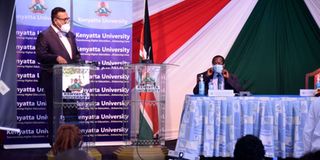Sh3bn hotels kitty not free money, says Balala

Tourism and Wildlife Cabinet Secretary Najib Balala (left) during the global tourism resilience and crisis management centre official assessment at Kenyatta University on January 21, 2021.
What you need to know:
- Kenya’s tourism industry is now repositioning itself to appeal to the domestic market in the face of Covid-19.
- Despite removal of an international travel ban on August 1st, tourists are only expected to return in limited numbers as the government requires all travellers to carry negative Covid-19 certificates
Hotels should not expect to receive a share of the government’s Sh3 billion Covid-19 stimulus package if they are not willing to provide security for the money since it is not free cake.
This is according to Tourism Cabinet Secretary Najib Balala who blames most of the facilities for expecting that the government was doling out free cash through the kitty, even as he admits that most of the businesses are recording poor performance.
Mr Balala spoke as most of the hotels continue to face a number of challenges, which have rendered thousands jobless, several facilities closed down, while those in operation are struggling to stay afloat
“They think it is a grant, these are loans. We have given very good incentives for the loans, but it has to be paid. You must provide security for it, this is not a grant and if you think it’s a grant then you are not a serious person who deserves this loan,” the CS said on Thursday at Kenyatta University.
He said of the Sh3 billion the government released to the sector, only Sh1 billion had been given out to various hotels, while the balance remains untouched.
This even as many hotels, particularly those that rely on foreign tourists and travelers, continuing to suffer losses due to poor business, with many admitting to be performing at between 15 and 30 percent of their capacity.
Lay off staff
Hotels have had to lay off thousands of staff and scale down operations immensely, as they implement more cost-cutting measures in order to stay survive the tough times. Those that spoke to Nation said they had submitted their requests for funds through the Kenya Association of Hotel Keepers and Caterers (KAHC).
But Mr Balala said the government had no way of intervening, indicating that economic impacts of the pandemic would continue to affect the wider tourism industry up to 2025, risking an imminent collapse of businesses without strong financial muscle.
He said the ministry was aware of the poor performance of the industry, based on data from the number of visitors coming into the country. “We see from the numbers at the airport and they are very small,” CS Balala said, while indicating that he had written to Health CS Mutahi Kagwe requesting that workers in the tourism industry be prioritised when the time comes to vaccinate people as a way of inspiring confidence among visitors to the country.
Kenya’s tourism industry is now repositioning itself to appeal to the domestic market in the face of Covid-19.
Despite removal of an international travel ban on August 1st, tourists are only expected to return in limited numbers as the government requires all travellers to carry negative Covid-19 certificates and it limits entries to countries with low infection rates.
For a sector that makes up around 10 percent of GDP, the loss of virtually all tourist arrivals since March 2020 has spelt disaster for hotels and tour operators that once relied on a steady stream of long-haul visitors.





